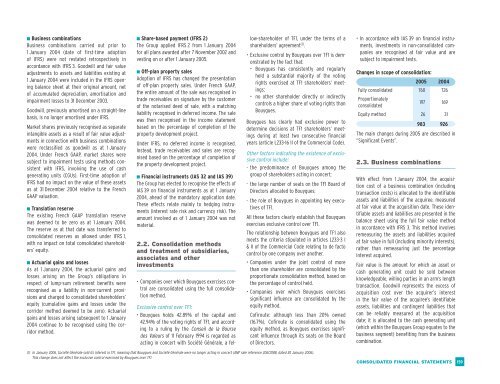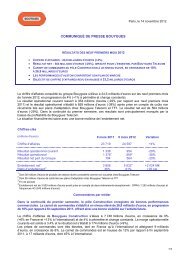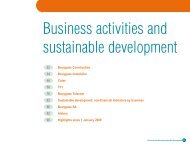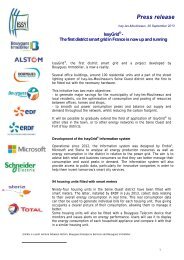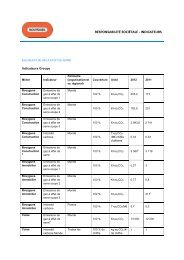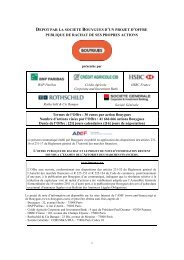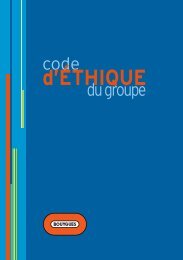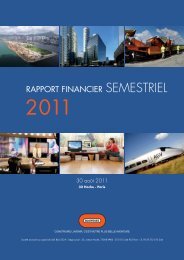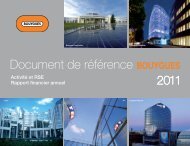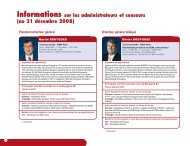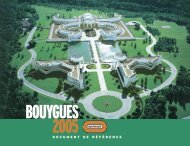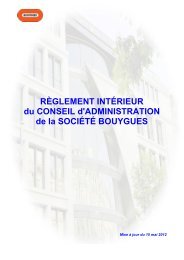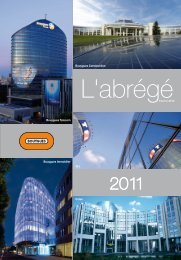A N N U A L R E P O R T - Bouygues
A N N U A L R E P O R T - Bouygues
A N N U A L R E P O R T - Bouygues
Create successful ePaper yourself
Turn your PDF publications into a flip-book with our unique Google optimized e-Paper software.
■ Business combinations<br />
Business combinations carried out prior to<br />
1 January 2004 (date of first-time adoption<br />
of IFRS) were not restated retrospectively in<br />
accordance with IFRS 3. Goodwill and fair value<br />
adjustments to assets and liabilities existing at<br />
1 January 2004 were included in the IFRS opening<br />
balance sheet at their original amount, net<br />
of accumulated depreciation, amortisation and<br />
impairment losses to 31 December 2003.<br />
Goodwill, previously amortised on a straight-line<br />
basis, is no longer amortised under IFRS.<br />
Market shares previously recognised as separate<br />
intangible assets as a result of fair value adjustments<br />
in connection with business combinations<br />
were reclassified as goodwill as at 1 January<br />
2004. Under French GAAP, market shares were<br />
subject to impairment tests using methods consistent<br />
with IFRS, involving the use of cash<br />
generating units (CGUs). First-time adoption of<br />
IFRS had no impact on the value of these assets<br />
as at 31 December 2004 relative to the French<br />
GAAP valuation.<br />
■ Translation reserve<br />
The existing French GAAP translation reserve<br />
was deemed to be zero as at 1 January 2004.<br />
The reserve as at that date was transferred to<br />
consolidated reserves as allowed under IFRS 1,<br />
with no impact on total consolidated shareholders’<br />
equity.<br />
■ Actuarial gains and losses<br />
As at 1 January 2004, the actuarial gains and<br />
losses arising on the Group’s obligations in<br />
respect of lump-sum retirement benefits were<br />
recognised as a liability in non-current provisions<br />
and charged to consolidated shareholders’<br />
equity (cumulative gains and losses under the<br />
corridor method deemed to be zero). Actuarial<br />
gains and losses arising subsequent to 1 January<br />
2004 continue to be recognised using the corridor<br />
method.<br />
■ Share-based payment (IFRS 2)<br />
The Group applied IFRS 2 from 1 January 2004<br />
for all plans awarded after 7 November 2002 and<br />
vesting on or after 1 January 2005.<br />
■ Off-plan property sales<br />
Adoption of IFRS has changed the presentation<br />
of off-plan property sales. Under French GAAP,<br />
the entire amount of the sale was recognised in<br />
trade receivables on signature by the customer<br />
of the notarised deed of sale, with a matching<br />
liability recognised in deferred income. The sale<br />
was then recognised in the income statement<br />
based on the percentage of completion of the<br />
property development project.<br />
Under IFRS, no deferred income is recognised.<br />
Instead, trade receivables and sales are recognised<br />
based on the percentage of completion of<br />
the property development project.<br />
■ Financial instruments (IAS 32 and IAS 39)<br />
The Group has elected to recognise the effects of<br />
IAS 39 on financial instruments as at 1 January<br />
2004, ahead of the mandatory application date.<br />
These effects relate mainly to hedging instruments<br />
(interest rate risk and currency risk). The<br />
amount involved as of 1 January 2004 was not<br />
material.<br />
2.2. Consolidation methods<br />
and treatment of subsidiaries,<br />
associates and other<br />
investments<br />
• Companies over which <strong>Bouygues</strong> exercises control<br />
are consolidated using the full consolidation<br />
method.<br />
Exclusive control over TF1:<br />
• <strong>Bouygues</strong> holds 42.89% of the capital and<br />
42.94% of the voting rights of TF1, and according<br />
to a ruling by the Conseil de la Bourse<br />
des Valeurs of 11 February 1994 is regarded as<br />
acting in concert with Société Générale, a fellow-shareholder<br />
of TF1, under the terms of a<br />
shareholders’ agreement (1) .<br />
• Exclusive control by <strong>Bouygues</strong> over TF1 is demonstrated<br />
by the fact that:<br />
• <strong>Bouygues</strong> has consistently and regularly<br />
held a substantial majority of the voting<br />
rights exercised at TF1 shareholders’ meetings;<br />
• no other shareholder directly or indirectly<br />
controls a higher share of voting rights than<br />
<strong>Bouygues</strong>.<br />
<strong>Bouygues</strong> has clearly had exclusive power to<br />
determine decisions at TF1 shareholders’ meetings<br />
during at least two consecutive financial<br />
years (article L233-16 II of the Commercial Code).<br />
Other factors indicating the existence of exclusive<br />
control include:<br />
- the predominance of <strong>Bouygues</strong> among the<br />
group of shareholders acting in concert;<br />
- the large number of seats on the TF1 Board of<br />
Directors allocated to <strong>Bouygues</strong>;<br />
- the role of <strong>Bouygues</strong> in appointing key executives<br />
of TF1.<br />
All these factors clearly establish that <strong>Bouygues</strong><br />
exercises exclusive control over TF1.<br />
The relationship between <strong>Bouygues</strong> and TF1 also<br />
meets the criteria stipulated in articles L233-3 I<br />
& II of the Commercial Code relating to de facto<br />
control by one company over another.<br />
• Companies under the joint control of more<br />
than one shareholder are consolidated by the<br />
proportionate consolidation method, based on<br />
the percentage of control held.<br />
• Companies over which <strong>Bouygues</strong> exercises<br />
significant influence are consolidated by the<br />
equity method.<br />
Cofiroute: although less than 20% owned<br />
(16.7%), Cofiroute is consolidated using the<br />
equity method, as <strong>Bouygues</strong> exercises significant<br />
influence through its seats on the Board<br />
of Directors.<br />
• In accordance with IAS 39 on financial instruments,<br />
investments in non-consolidated companies<br />
are recognised at fair value and are<br />
subject to impairment tests.<br />
Changes in scope of consolidation:<br />
2005 2004<br />
Fully consolidated 760 726<br />
Proportionately<br />
consolidated<br />
197 169<br />
Equity method 26 31<br />
983 926<br />
The main changes during 2005 are described in<br />
“Significant Events”.<br />
2.3. Business combinations<br />
With effect from 1 January 2004, the acquisition<br />
cost of a business combination (including<br />
transaction costs) is allocated to the identifiable<br />
assets and liabilities of the acquiree, measured<br />
at fair value at the acquisition date. These identifiable<br />
assets and liabilities are presented in the<br />
balance sheet using the full fair value method<br />
in accordance with IFRS 3. This method involves<br />
remeasuring the assets and liabilities acquired<br />
at fair value in full (including minority interests),<br />
rather than remeasuring just the percentage<br />
interest acquired.<br />
Fair value is the amount for which an asset or<br />
cash generating unit could be sold between<br />
knowledgeable, willing parties in an arm’s length<br />
transaction. Goodwill represents the excess of<br />
acquisition cost over the acquirer’s interest<br />
in the fair value of the acquiree’s identifiable<br />
assets, liabilities and contingent liabilities that<br />
can be reliably measured at the acquisition<br />
date; it is allocated to the cash generating unit<br />
(which within the <strong>Bouygues</strong> Group equates to the<br />
business segment) benefiting from the business<br />
combination.<br />
(1) In January 2006, Société Générale sold its interest in TF1, meaning that <strong>Bouygues</strong> and Société Générale were no longer acting in concert (AMF sale reference 206C0188, dated 30 January 2006).<br />
This change does not affect the exclusive control exercised by <strong>Bouygues</strong> over TF1.<br />
CONSOLIDATED FINANCIAL STATEMENTS<br />
159


